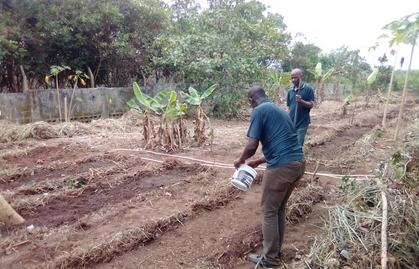
support@yorubalibrary.com
+2348073529208, 07038599574

Yoruba traditional farming techniques have been honed over centuries, reflecting a deep understanding of the land and a commitment to sustainable practices. These techniques are integral to the Yoruba way of life, providing food, economic stability, and cultural continuity.
The Importance of Farming in Yoruba Culture
Farming is a cornerstone of Yoruba culture, supporting the community with staple crops and playing a key role in cultural practices. Agriculture is not just an economic activity; it is intertwined with the Yoruba people's social and religious life. Festivals, rituals, and ceremonies often revolve around the agricultural calendar, emphasizing the community’s connection to the land and the cycles of nature.
Key Crops and Their Significance
Yoruba farmers cultivate a variety of crops, each with its own cultural and economic importance. The primary crops include:
• Yam (Isu): A staple food and a symbol of wealth and prosperity. Yam festivals celebrate the harvest and honor the deities associated with agriculture.
• Cassava (Ege): Used to produce garri, a key component of the Yoruba diet.
• Maize (Agbado): Grown for its versatility and used in numerous traditional dishes.
• Cocoyam (Koko): Valued for its nutritional benefits and ease of cultivation.
• Vegetables and Fruits: Such as okra, peppers, and plantains, which are essential for a balanced diet.
Traditional Farming Methods
Yoruba traditional farming techniques are characterized by their sustainability and efficiency. Key methods include:
• Slash-and-Burn Agriculture (Egan): This technique involves clearing a section of land by cutting down vegetation and burning it. The ash enriches the soil with nutrients, making it fertile for planting. However, this method is carefully managed to prevent environmental degradation.
• Crop Rotation (Iyipada Irugbin): Farmers rotate crops to maintain soil fertility and reduce the risk of pests and diseases. This practice ensures that the soil remains productive over long periods.
• Mixed Cropping (Irigbin Apapo): Growing multiple crops on the same plot of land to maximize yield and reduce the risk of total crop failure. This method also promotes biodiversity and improves soil health.
• Organic Fertilizers (Ajile): Using compost, animal manure, and other natural materials to enrich the soil, avoiding the harmful effects of synthetic fertilizers.
• Manual Weeding and Pest Control (Oko sisan): Farmers use traditional tools and natural methods to control weeds and pests, minimizing the use of chemicals.
Tools and Implements
Yoruba farmers utilize a range of traditional tools that are simple yet effective. These include:
• Hoe (Oko): The primary tool for tilling the soil and weeding.
• Cutlass (Ada): Used for clearing vegetation and harvesting crops.
• Dibbler: A pointed tool for planting seeds.
• Baskets and Trays (Apere): For carrying harvested produce.
The Role of Festivals and Rituals
Agricultural activities are deeply embedded in Yoruba festivals and rituals. The New Yam Festival, for example, is a major event that marks the beginning of the yam harvest. During this festival, yams are offered to the gods and ancestors, thanking them for a bountiful harvest and seeking their blessings for the next planting season. These ceremonies reinforce the community’s connection to the land and the spiritual world.
Community and Knowledge Transfer
Farming knowledge is traditionally passed down through generations, ensuring that younger members of the community learn the skills and practices necessary for successful farming. This transfer of knowledge includes not only practical techniques but also the cultural and spiritual aspects of agriculture.
Challenges and Adaptations
While traditional farming techniques have proven sustainable, Yoruba farmers face modern challenges such as climate change, land degradation, and economic pressures. To address these issues, many communities are blending traditional practices with modern agricultural innovations. This hybrid approach helps to preserve cultural heritage while enhancing productivity and resilience.
Conclusion
Yoruba traditional farming techniques are a testament to the ingenuity and adaptability of the Yoruba people. These methods, rooted in a deep understanding of the environment, ensure food security, cultural continuity, and sustainable land use. By preserving and adapting these techniques, the Yoruba community continues to thrive and maintain a harmonious relationship with the land.

Learn about the Yoruba concept of Ìwà Pẹ̀lẹ́ (good…

Learn special praises for Divine Being and Creator…